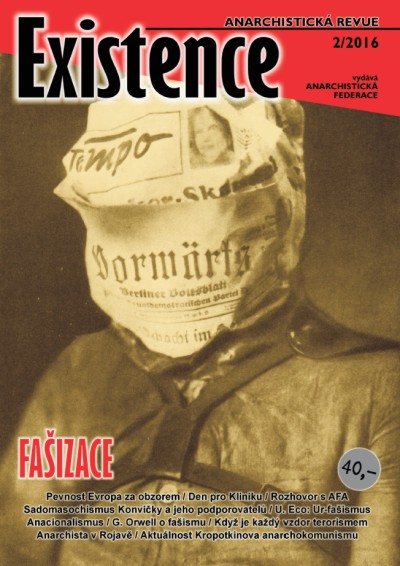Riot Over River Winter
Benefice pro Solidarity Collectives na Ukrajině. …(více)

The past year in Czechia could be characterised by a surge of fear and hatred, especially against people fleeing away from war and poverty. Despite the fact that this issue does not greatly apply to Czechia, similar situation is visible in all the Central European countries of the former Eastern Bloc including the eastern part of Germany. Many negative signs in the society call for parallels with Europe of the 30ies and the beginning of fascist regimes. That is why we chose increasing fascist attitude to be the topic of this issue of Existence.
We ask the questions to what extend it is appropriate to speak of fascism, to what extend is the social situation changing, what are the grounds and tools of xenophobes who can be heard in media and in the streets, and why a considerable part of the society succumbs to their hateful and mostly false rhetoric so easily. For the answers we are looking for example in an interview with a member of the Antifascist action which commemorates the 20th anniversary of its existence. A list of features of fascist tendencies in a society created by Umberto Eco who died this year we consider to be really apt for understanding. Peter Gelderloos is answering the question, how fascism is useful to the contemporary regime and another article examines Czech xenophobes from the point of schizo-analysis and critical theory. We mention George Orwell’s reflection of fascism in 1936, and finally we introduce Eugén Lanti and his efforts to defy nationalism.
As for the activities of the Czech anti-authoritarian movement we bring an extensive report of the demonstration against “The Fortress Europe”, and information about events supporting the autonomous social centre Klinika which was attacked by neo-Nazis and later by public officials and local politicians. We also visit Israel and Rojava. The Palestinian human rights defender Rafat Sub Laban from the Addameer organization speaks about the law applied by the apartheid to the second-grade people. The events in Rojava are commented on in two interviews, with Janet Biehl and a Spanish anarchist who joined the YPG forces.
An extensive theoretical article by Vadim Damier focuses on P.A. Kropotkin’s ideas and evaluates many of his conclusions as useful and inspiring for the present day. The article “Without Patriarchy“ looks into the feminist tendencies inside Islam.
Further there are texts from the wall newspapers A3 of the last three months, and book and magazine reviews.
Benefice pro Solidarity Collectives na Ukrajině. …(více)
Solidární pochod Plzní za Palestinu …(více)
Otevřené setkání v Brně …(více)
Koncert …(více)
Rojava hoří, svět mlčí a Turecko profituje. Proč se kurdská autonomie nikomu nehodí
denikalarm.cz 26.1.2026Grónsko nechce jen Trump, ale také skupina amerických miliardářů, kteří by na anexi vydělali
denikalarm.cz 17.1.2026„Vypadněte z našeho města!“ Spojené státy jsou v šoku po zastřelení mladé ženy v Minneapolisu
denikalarm.cz 9.1.2026Komu slouží Aliance pro rodinu? Antigenderová hnutí v politice nahrávají oligarchům i kapitálu
denikalarm.cz 22.12.2025